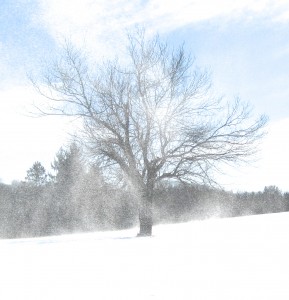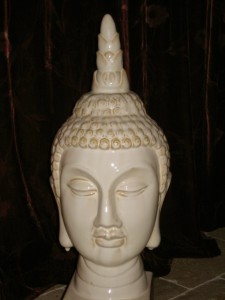
I dream. I am with a father and his son, meeting at a busy intersection where two highways intersect. We have to walk a long way to get where we are going. The child is young, about four or five, and I’m aware that it’s too far for him to walk. I find an old metal lounge chair on wheels in a ditch, pull it out, and set it up for the child. I intend to push him. The father wants to lie down and be pushed. “No,” I say, “it’s for the child.” Every time he attempts to lie down on the chair I yell at him. “No, stand up! It’s for the child.”
Next I dream that Chuck and I are at a restaurant with a young couple who have two young children, ages two and four. We have taken the kids to the bathroom and are just returning to the table with the two kids, now naked. As soon as the parents see the naked kids they reject them. “That’s not my kid!” the mother says. “He’s not mine. I don’t want him, he’s not my kid.” She is adamant, as is the father who also pipes up, “Those aren’t our kids, we don’t want them.”
I am stunned when I hear this because of course the kids belong to them. I also see that the two kids are deeply affected by this rejection by the parents. They are hurt, but they also don’t understand. How can they not be acceptable to their own parents? What have they done to deserve this? Nothing; they are innocent. This rejection is painful to behold. I see that the pain of the children is deep. “I don’t care what you think,” I say to the parents, leaning in close. “Even if you are going to reject your children, don’t ever let them hear you say that!” The parents are unaffected. They will not accept their children. Chuck and I stand there wondering what we’ll do now, but try as we might we just cannot convince the parents that these are their very own children. They continue to deny them, speaking loudly so that all in the restaurant can hear. The two children sit at the table looking lost, confused, and clearly in deep pain. These are inner world dreams, confronting the roles and dynamics of the inner parent and the inner child, how to be fully adult and accepting of our true innocence without fear and judgment.
Our role as responsible inner adult may have to go through several phases of development. And just as our childhood asked most of us to withstand some kind of rejection and confusion from our own parents, and from life itself, so does our inner child have to endure the same from us. We might have to be a rejecting inner parent before we can become the gentle and loving parent we are capable of. We might have to become a stern, judging parent before we can become a totally accepting nonjudgmental parent. But no matter what our process entails, in order to become wholly reconciled beings, we must achieve balance between these two personalities that dominate our inner world.
The process of achieving balance will most likely entail something like the dynamics in my dreams. We must accept that we are both the parent and the child. If I were a child, would I want to be treated like that? What kind of parent do I want to be?
We must keep in mind that the child, at its core, is innocent, unaware of the greater world and so what happens to the child is largely a mystery and a puzzle that must somehow be coped with and made sense of. With its limited capacities and knowledge of how the world works, the child will not necessarily have the resources to understand and so conclusions may be misconstrued or downright false. Ruled by feelings and emotions the child seeks only to return as quickly as possible to a state of equilibrium and safety, skewed though that state may be. And so the child is protected by its innocence in one way, but its innocence also makes it extremely vulnerable as well.
We must keep in mind that the parent, at its core, is just trying to figure life out. As adults we know that we had to find our way in the world all on our own. For no matter what kind of upbringing we had, we each had to go out into the world and encounter and live our own separate lives. We had to learn to be responsible for ourselves in a world that was often rejecting, judgmental, and unkind. We had to learn what it meant to be an adult. When we had children of our own we had to learn what it meant to be a parent. Life does not come with an owner’s manual, it has to be lived to be learned. Whether we have birthed our own children or not, does not matter, we all have an inner parent inside us somewhere, just as we all have an inner child inside too. We have all experienced childhood and we have all experienced adulthood first hand. For true reconciliation of our inner world, we must all become our own parents, both our own mother and our own father.

The inner parent must be held accountable for its position of responsibility if we are to heal and evolve, if we are to achieve wholeness in our lifetime. The inner parent must be like the adult I was in my first dream, and say, “No, this is for the child,” as we protect and care for the inner child, appropriately attending to its real needs. When we slip into childish behavior and neediness, our inner parent must speak up and say, “You are the adult, so be one!” I saw clearly in that dream that the child was unfit for the long walk and I found appropriate means to remedy the situation. In my maternal role, however, I encountered the father who sought to be taken care of like a child, when another caring adult arrived and took over. Perhaps I should not have remedied the situation for him, but made him responsible for taking care of his own child to begin with, but my dream did not go that way. It was showing me something else. When someone outside of us takes over, we may very easily fall back into a regressive place, ignoring our own inner child’s real needs, abdicating our parental role of responsibility.
Just as acceptance of our innocence is crucial in achieving wholeness, so is the adult role. The adult self must be firmly established as the one who makes the decisions, fairly and judiciously, with the child’s interests in mind. Even those who have never had the joys and pains of parenting in real life, must face the same dilemmas that all parents face when presented with their inner child. Parenting is a daunting and frightening task and we all want to do a good job. We only have so much time to pour all we wish for our real children into them before they go out into the world. Our time with them is relatively short. The inner parent child relationship, however, has the advantage of longevity. We are together for a lifetime, perhaps even many.
At some point we must face our dual roles as our own parent and our own child. We must do the work of raising our inner child by becoming the loving and compassionate parent that we are all capable of being. We have the opportunity to get it right, even if our own parents didn’t get it right, for having been a child we know what the child needs and we know what we would like in a parent.
In the second dream, the parents reject their children outright. This does not bode well, but I am gifted with the child’s innocence in this dream, for I experience it quite palpably. The child’s reaction to the rejection by the parents is clearly felt, so easy to read. And so we must ask ourselves: Am I as rejecting of my inner child as these heartless parents are? Again I have an adult role in this dream, observer and teacher, and once again I call the adults to the carpet. “Be good parents, even if you have to fake it,” is really what I’m saying. “Just because your children are naked, their innocence exposed, don’t reject them.” Don’t reject your own innocence, in other words, for that is where the deepest issues lie, in what our innocent child self has been bearing, or baring.
These two dreams contain many more sublayers, but my point today is to impart how critical it is that as evolving spiritual beings we reconcile our inner dilemmas. We must be loving adults and parents to our inner children. We must be able to decipher the difference between regression states and states of innocence and real need. Our inner children may present us with just as many difficult situations as our real children do, and so we are asked to be good parents in our inner world, just as we are asked to be in our outer world.
Sometimes we must be firm before we can be soft. Sometimes our inner child must scream to be heard. Sometimes we must fail before we can make some progress. It’s just how life is, inner and outer life.
The inner world is as real as the outer world, as impacting and as important to our lives now as in the future. And so, if we continue to go deeper into our inner world, and resolve the issues of reality there, then our outer world issues will naturally resolve as well. And don’t forget to look closely at dreaming life, for dreams are part of the inner process, offering very personal, as well as universal, nightly guidance.
Seeking balance, parenting and innocent too,
Jan









